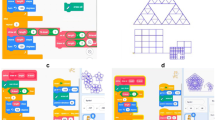Abstract
The main goal of this study is to show that young makers (8–12 years old) are able to start programming & making electronics with Snap4Arduino, and that this is a way to have (already trained) Makers for secondary level education. We have performed a feasibility study of the Snap4Arduino as an educational tool for elementary school students. The study has been conducted as part of a certified course carried out by the Pamplona’s Planetarium where different skills such as learning to learn or sense of initiative and entrepreneurship were evaluated through a PrBL project based learning methodology. Cooperative learning was achieved focusing on teamwork attitude and behavior.
Access this chapter
Tax calculation will be finalised at checkout
Purchases are for personal use only
Similar content being viewed by others
References
Sousa, D.A.: How the Brain Learns. The National Association of Secondary School Principals, Reston (1995)
Mettas, A.C., Constantinou, C.C.: The technology fair: a project-based learning approach for enhancing problem solving skills and interest in design and technology education. Int. J. Technol. Des. Educ. 18, 79–100 (2007)
Blumenfeld, P.C., Soloway, E., Marx, R.W., Krajcik, J.S., Guzdial, M., Palincsar, A.: Motivating Project-based learning: Sustaining the doing, supporting the learning. Educ. Psychol. 26, 369–398 (1991). (3 y 4)
Resnick, M.: Learn to code, code to learn: how programming prepares kids for more than math (2013). https://www.edsurge.com/news/2013-05-08-learn-to-code-code-to-learn. Accessed 21 Feb 2017
Salido, M.R.: El juego de las siete notas. Exedra: revista científica 2, 289–308 (2011)
Goleman, D.: Inteligencia Emocional. Kaidós, Barcelona (1996)
Alonso, C., Guitert, M., Area, M., Romeu, T.: Tendencias emergentes en Educación con TIC. Espiral, Barcelona (2012)
Acknowledgments
We would like to thank the Planetarium of Pamplona and in particular Diana Gonzalez for giving us the opportunity of implementing the course and for all their support.
Author information
Authors and Affiliations
Corresponding author
Editor information
Editors and Affiliations
Rights and permissions
Copyright information
© 2017 Springer International Publishing AG
About this paper
Cite this paper
Pina, A., Ciriza, I. (2017). Primary Level Young Makers Programming & Making Electronics with Snap4Arduino. In: Alimisis, D., Moro, M., Menegatti, E. (eds) Educational Robotics in the Makers Era. Edurobotics 2016 2016. Advances in Intelligent Systems and Computing, vol 560. Springer, Cham. https://doi.org/10.1007/978-3-319-55553-9_2
Download citation
DOI: https://doi.org/10.1007/978-3-319-55553-9_2
Published:
Publisher Name: Springer, Cham
Print ISBN: 978-3-319-55552-2
Online ISBN: 978-3-319-55553-9
eBook Packages: EngineeringEngineering (R0)




